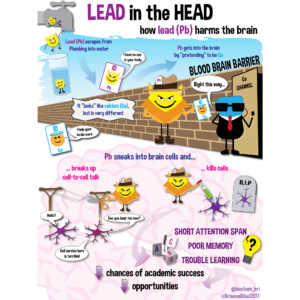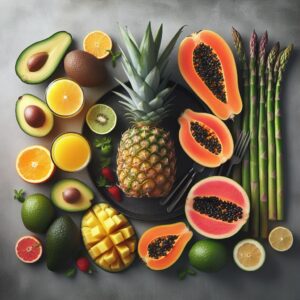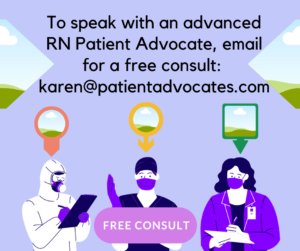Healthy Body Herald #3 – Geriatricians, FDA is warning on Apple Sauce, GABA, Wegovy and More

Healthy Body Herald…knowledge is power
The more you understand about how your body works, the better you can work more closely with your doctors to stay as healthy as possible.
Karen Mercereau, RN, RN Patient Advocate
Table of Contents:
- There are physicians who are specially trained to work with the elderly – they are called geriatricians. They can tailor your medical care to your aging body’s needs.
- The FDA is warning that some of the applesauce products that we are giving to our toddlers have LEAD in them. Lead can damage developing brains.
- Have You Heard of GABA? This Supplement May Help You Manage Anxiety and Depression.
- Did you know that your small intestine is often called your second brain? What? It is true. Learn what Harvard can teach us about this.
- Have you heard of the process of Inflammation in our bodies? How can it help us heal but it also can lead to increasing states of illness? Diseases due to inflammation cause more than 50% of all deaths globally.
- Are you or one of your family or friends taking a medication called Wegovy for weight loss? You may wish to read some of the small print on Side Effects or Interactions before you make up your mind.
- Strawberries. We all love them. Do you know though that they have more pesticides in and on them than any other fruit or vegetable? Read on…..
1. Geriatricians – physicians trained to provide healthcare for the elderly. From Johns Hopkins “When your children were little, you probably took them to a pediatrician. After all, babies and children have specialized needs that differ from those of adults. 
On the other end of the spectrum, older adults often have different medical concerns than they had in their 30s or 40s. Yet many people have no idea that there are specialists just for seniors.”
https://my.clevelandclinic.org/health/articles/geriatrician
2. The FDA is warning that some of the applesauce products that we are giving to our toddlers have LEAD in them. Lead can damage developing brains.
 Lead in some applesauce products for our little kids?
Lead in some applesauce products for our little kids?
Yes and the FDA has suggested that we throw them away. If your toddler has been eating them often, you might want to ask your pediatrician about doing a lab test to check. Lead can stunt brain development. Good to know. Also good to know is that we can now remove that lead from a little body if necessary! https://apple.news/AeDbEmYVST5mVc_D72_GchQ
 3. Have You Heard of GABA? This Supplement May Help You Manage Anxiety and Depression. Gamma-aminobutyric acid, commonly known as GABA, is an amino acid (a molecule that builds proteins) and is naturally produced in the brain. GABA acts as an inhibitory neurotransmitter, is a chemical that can block anxiety messages between brain cells. (called an inhibitory neurotransmitter). Because of this, GABA serves a critical role in reducing brain activity to calm the central nervous system.
3. Have You Heard of GABA? This Supplement May Help You Manage Anxiety and Depression. Gamma-aminobutyric acid, commonly known as GABA, is an amino acid (a molecule that builds proteins) and is naturally produced in the brain. GABA acts as an inhibitory neurotransmitter, is a chemical that can block anxiety messages between brain cells. (called an inhibitory neurotransmitter). Because of this, GABA serves a critical role in reducing brain activity to calm the central nervous system.
Read Here: https://apple.news/Ac8XGc_y6T7eCjvqED8KL9w
4. Did you know that your small intestine is often called your second brain? You may rightly ask how this could be true. Harvard explains it this way: The enteric nervous system that regulates our gut is often called the body’s “second brain.”
“Although it can’t compose poetry or solve equations, this extensive network uses the same chemicals and cells as the brain to help us digest and to alert the brain when something is amiss. Gut and brain are in constant communication.”
 “Normally, when we see something tasty, the brain signals the gut to prepare for incoming food. When we feel anxious or stressed, we might experience these as abdominal pain, diarrhea, nausea, or “butterflies.” Messages travel from gut to brain, too. This helps .”
“Normally, when we see something tasty, the brain signals the gut to prepare for incoming food. When we feel anxious or stressed, we might experience these as abdominal pain, diarrhea, nausea, or “butterflies.” Messages travel from gut to brain, too. This helps .”
Harvard article: https://hms.harvard.edu/news-events/publications-archive/brain/gut-brain#:~:text=The%20enteric%20nervous%20system%20that,brain%20when%20something%20is%20amiss.
Read more here: https://apple.news/AlU5ab0oETtOKLx2AKiuOzw
5. Inflammation – rather a two-edged sword. When we are injured, it helps us to heal. But there is another, chronic form of inflammation that can be very harmful.
- Let’s take a closer look. Really closer. There is a part of the brain called the Hypothalamus that is connected to another part called the Pituitary and hormones from these connect directly to our Adrenal Gland. So, when we are injured (scratches, bumps, bites, and so forth) the Adrenal Gland pumps out chemicals that stimulate the Immune System to send particles to the area to start the healing process.
- So what does chronic inflammation look like and why do we need to know? As mentioned in the Table of Contents, diseases of chronic inflammation account for more than 50% of all deaths globally. What diseases are these? Cancer, cardiovascular disease, dementia, stroke and diabetes. Some of the symptoms include: Chills, Fatigue or loss of energy, Headaches, Loss of appetite, and Muscle stiffness.
Chronic inflammation can cause the following symptoms:
- Body pain
- Gastrointestinal complications such as constipation, diarrhea, and acid reflux
- Weight gain or loss
- Frequent infections
- Depression, anxiety, and mood disorders

Inflammation by Nick Youngson CC BY-SA 3.0 Alpha Stock Images
Fortunately, if you suspect some of these conditions may be occurring, there are some lab tests that insurance covers called Inflammation Markers. If you suspect that your body may be having higher levels of chronic inflammation, you can ask your physician or NP to order some lab studies to check this out. If you do have higher levels of inflammation, there are many helpful ways to reverse this!
https://arupconsult.com/content/inflammatory-markers
If you are experiencing higher levels of inflammation there are several ways to reduce it. Your healthcare provider may prescribe some medications. However, right off the bat, there is something that you can do for yourself. It is called the
Anti-Inflammatory Diet and you can start it now.
Here are some tips from Harvard to help you get started:
6. Wegovy. If you or someone you love is taking this, it would be a helpful idea to look a bit closer at some of the side effects that you may not know.
This site – rxlist.com,is incredibly helpful in avoiding potential problems with your meds. Now, with Wegovy, there are some Warnings and Precautions that include: Risk of Thyroid C-Cell Tumors, Pancreatitis, Gallbladder Disease, Acute kidney injury, allergic response, Heart Rate Increase, Suicidal Thoughts, blood sugar that is too low. There is also quite a list of potential side effects at this site.
See what you think. https://www.rxlist.com/wegovy-drug.htm#description
7. Strawberries! So excellent in so many ways. However, as mentioned, they have more pesticides on and in them than any other fruit or vegetable! Here is a good way to find out more.
 Have you heard about the Dirty Dozen/Clean Fifteen from the Environmental Working Group? This can save you money and help to protect you and your family at the grocery store. You do not need to spend money on organic everything. There is a whole list called the Clean Fifteen that lists fruits and vegetables that are safe to buy without spending the money for organic. For example: a few on the Clean Fifteen list are: Avocados, Pineapple, Papaya, Kiwi, and Asparagus. Learn more at www.ewg.org.
Have you heard about the Dirty Dozen/Clean Fifteen from the Environmental Working Group? This can save you money and help to protect you and your family at the grocery store. You do not need to spend money on organic everything. There is a whole list called the Clean Fifteen that lists fruits and vegetables that are safe to buy without spending the money for organic. For example: a few on the Clean Fifteen list are: Avocados, Pineapple, Papaya, Kiwi, and Asparagus. Learn more at www.ewg.org.
Meanwhile, good to know – the first two items to absolutely, buy organic instead of the regular ones are ***Strawberries (the most heavily laced with pesticides fruit in the store!) and ****Blueberries. The Environmental Working Group (EWG) has found that 90% of non-organic blueberries contain pesticide residues, including bee-killing neonics. In 2024, EWG’s Shopper’s Guide to Pesticides in Produce reported that 46% of blueberries tested contained Boscalid, a fungicide that the EPA says may cause cancer.
This is a good site to visit to learn more: www.ewg.org.



Recent Comments